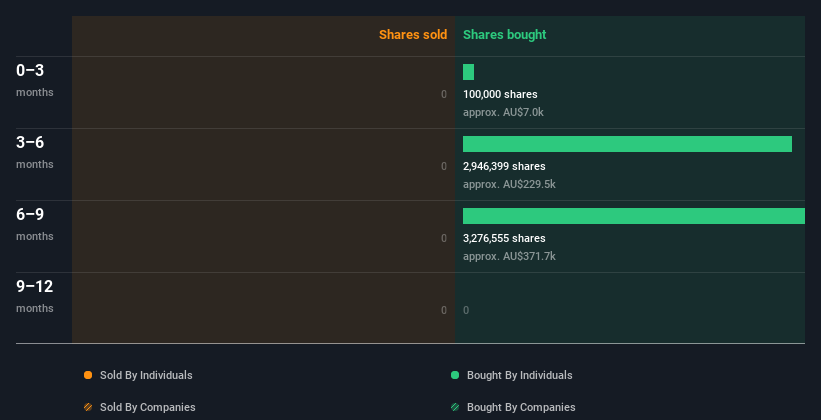Insider Buyers Lose AU$435k As Rhinomed Sheds AU$1.4m
The recent 14% drop in Rhinomed Limited's (ASX:RNO) stock could come as a blow to insiders who purchased AU$624.8k worth of stock at an average buy price of AU$0.099 over the past 12 months. This is not good as insiders invest based on expectations that their money will appreciate over time. However, as a result of recent losses, their original investment is now worth only AU$189.7k.
While we would never suggest that investors should base their decisions solely on what the directors of a company have been doing, we would consider it foolish to ignore insider transactions altogether.
Check out our latest analysis for Rhinomed
Rhinomed Insider Transactions Over The Last Year
The insider Meredith George made the biggest insider purchase in the last 12 months. That single transaction was for AU$372k worth of shares at a price of AU$0.11 each. That means that even when the share price was higher than AU$0.03 (the recent price), an insider wanted to purchase shares. While their view may have changed since the purchase was made, this does at least suggest they have had confidence in the company's future. We always take careful note of the price insiders pay when purchasing shares. Generally speaking, it catches our eye when insiders have purchased shares at above current prices, as it suggests they believed the shares were worth buying, even at a higher price.
While Rhinomed insiders bought shares during the last year, they didn't sell. The average buy price was around AU$0.099. I'd consider this a positive as it suggests insiders see value at around the current price. You can see a visual depiction of insider transactions (by companies and individuals) over the last 12 months, below. If you click on the chart, you can see all the individual transactions, including the share price, individual, and the date!
Rhinomed is not the only stock insiders are buying. So take a peek at this free list of growing companies with insider buying.
Have Rhinomed Insiders Traded Recently?
Non-Executive Director John McBain bought just AU$7.0k worth of shares in that time. That's not much at all. So it is hard to draw any conclusion about how insiders are feeling about the stock, from these recent trades.
Does Rhinomed Boast High Insider Ownership?
Looking at the total insider shareholdings in a company can help to inform your view of whether they are well aligned with common shareholders. We usually like to see fairly high levels of insider ownership. Rhinomed insiders own about AU$6.0m worth of shares (which is 69% of the company). This kind of significant ownership by insiders does generally increase the chance that the company is run in the interest of all shareholders.
What Might The Insider Transactions At Rhinomed Tell Us?
Insider purchases may have been minimal, in the last three months, but there was no selling at all. The net investment is not enough to encourage us much. On a brighter note, the transactions over the last year are encouraging. With high insider ownership and encouraging transactions, it seems like Rhinomed insiders think the business has merit. While we like knowing what's going on with the insider's ownership and transactions, we make sure to also consider what risks are facing a stock before making any investment decision. While conducting our analysis, we found that Rhinomed has 5 warning signs and it would be unwise to ignore them.
Of course Rhinomed may not be the best stock to buy. So you may wish to see this free collection of high quality companies.
For the purposes of this article, insiders are those individuals who report their transactions to the relevant regulatory body. We currently account for open market transactions and private dispositions of direct interests only, but not derivative transactions or indirect interests.
Have feedback on this article? Concerned about the content? Get in touch with us directly. Alternatively, email editorial-team (at) simplywallst.com.
This article by Simply Wall St is general in nature. We provide commentary based on historical data and analyst forecasts only using an unbiased methodology and our articles are not intended to be financial advice. It does not constitute a recommendation to buy or sell any stock, and does not take account of your objectives, or your financial situation. We aim to bring you long-term focused analysis driven by fundamental data. Note that our analysis may not factor in the latest price-sensitive company announcements or qualitative material. Simply Wall St has no position in any stocks mentioned.

